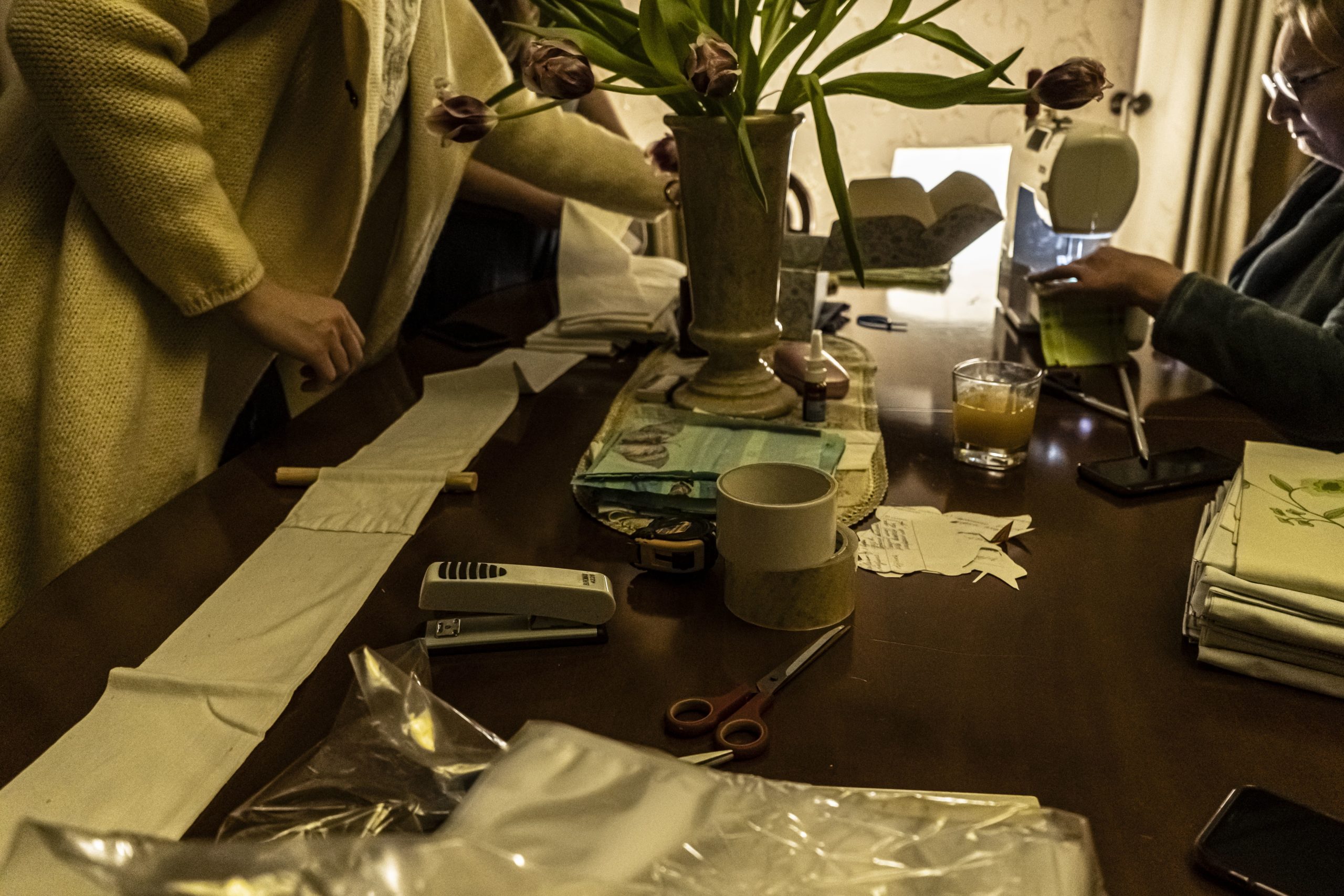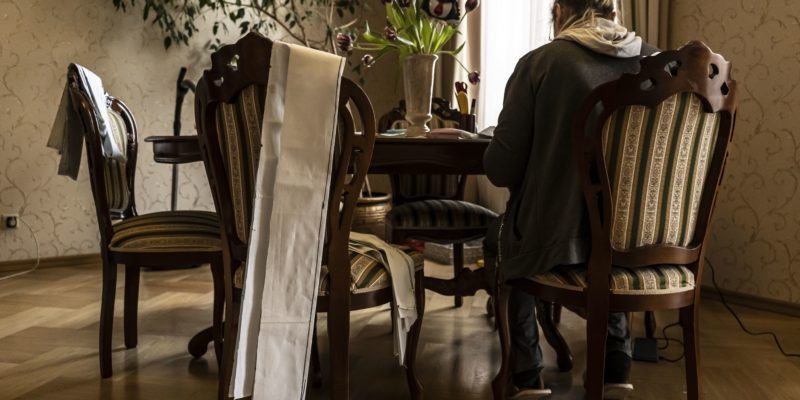Every night before going to sleep, Alexandra hurries to close the curtains on the window of the study overlooking the street, in this early twentieth-century building in a residential area not far from the central station, that has now become a place of transit and accommodation for people displaced by the war. Then she piles up blankets and pillows in the hallway and hopes she does not have to wake up, as is increasingly the case, to the sound of air-raid sirens. “They told me that this is the safest part of the house, between the two load-bearing walls,” she explains, “so I prepare everything and in case of an alarm we sit here on the floor. Our neighbours prefer to go to the basement instead, but it is too cold, and you have to take into account the time it takes to run down the stairs. I do not know what is best, in moments like these everyone does what they feel is right.”
Alexandra, a lawyer and partner in a law firm, shares her home with her husband, a four-and-a-half-year-old daughter, her mother and her sister. Since February 24, they have been sleeping in their clothes – in tracksuits that at least would allow them to escape quickly without going out in their pyjamas – and with suitcases ready, although everyone hopes they will never have to use them. So far, there has been no need hurry away from Lviv; on the contrary, the refugees from the rest of the country have arrived here, and in just a few days the city has become the largest reception centre in Ukraine, as well as a logistical hub for sorting civilian and military aid, both local and international.
At least so far, because the war has also arrived here, in western Ukraine, just a few kilometres from the Polish border and Europe. Last night, after a few days of truce, the sirens went off again, and Ivano-Frankivs’k to the south and Lutsk to the north of Lviv, less than 200 km away, were targeted.
Alexandra’s mother cannot sleep any more, she gets up early to turn on the TV in the kitchen and make breakfast for everyone. The screen alternates between images of the bombings and tanks, President Zelensky’s speeches and the comments of the journalists; then comes the graphics showing the vehicles shot down by the Russians, the dead soldiers, the new prisoners and the civilian victims. Around eleven in the morning the siren sounds again. Alexandra is out of the house, she has taken cover in a ‘shelter’ inside a club. The managers say the building is made of reinforced concrete, and therefore safe, but she is sceptical, because it is not underground and is also located on one of the highest areas of the city. She calls her mother, makes sure she is in the hallway with little Emma, and that they do not move from there until she calls them back to tell them that the alarm has ceased.
Young people here also have a smartphone app that alerts them in case of danger, which has become a useful safety tool in addition to the sirens.
On the night between Saturday 12 and Sunday 13 March, for the first time, the sound of the alarm was followed by the sound of missiles exploding a few kilometres from the city. The target was the Yavoriv military base, the Peacekeeping and Security Centre, along the road leading to the border with Poland, a crucial route not only for the exit of refugees but above all for the entry of supplies. A place where soldiers, both Ukrainian and international, are trained, and where it seems that trainers of different nationalities were also present. There were at least 35 deaths.
The suitcases of Alexandra’s family are ready, suspended like their lives and those of many other people who do not know what the best choice is: to send their young daughter abroad with her grandmother and stay here? To leave all together, or rather all of the women, because the husband could not leave the country anyway, and go to their friends in Poland who offered them hospitality and an independent space in their house? So to be guests, without work and without a project, with heart and head in their own country? And for how long?
“So far I have decided to stay,” says Alexandra, “because my home is the place that makes me feel safer, but since the latest news, with the worsening of the situation and this sense of impending danger, I no longer know what it means to be safe. Would I be safe in Europe? If this war caused a nuclear accident, we would all be in danger. So is it worth it to escape? I have a lot of friends who left Lviv at the end of February, many of them regret doing it so early, and today they say they could have waited. I am waiting, but now I am afraid that when I make up my mind, it will be too late.”
Her great-grandmother was of Russian origin, and she was the first teacher to open a school in Lviv. The family language has always been Russian, and she herself learned Ukrainian in primary school and became perfectly bilingual. “The problem never arose, because language does not identify nationality. I am Ukrainian, born and raised in Lviv, and I would not want to live anywhere else.”
In the life she now calls ‘normal’, Alexandra had a family and a job that fill her days. In today’s distraught life, she spends most of her time at home, with her sister and her mother, making handcrafted tourniquets to send to soldiers at the front who do not even have first-aid kits. “Everyone here is working hard, and no one is backing down,” she says. “Now we need these tools, but it is impossible to buy them, so we have come up with the idea of using old sheets. We cut them into strips, fold them in half, and sew them by machine, then we smooth wooden sticks with a cutter and insert them into a specially created loop of fabric that can be tightened to stop the blood, like professional tourniquets. The principle is the same, although the looks are more rudimentary.” They have been working for days like a perfect assembly line, with scissors, an iron, a sewing machine, and plastic bags for packing the finished pieces individually and putting them into boxes.
“Now we are starting to run out of medicines, even the most ordinary ones,” she adds. “We have managed to find a few dozen boxes of ibuprofen. We will send them to the front, too.”
The other day we heard from a relative who lives in Russia, who told us to join her in Moscow. They do not realise what is happening there, and many families tell that their relatives don’t even believe them, so much brainwashing has taken place over the years. They do not believe in this war; they think the images they see are created by anti-Russian propaganda. How else could they even think that any of us would want to go there now?”
Alexandra’s husband, who in his ‘other’ life worked in an oil company, now coordinates the aid that arrives at the Art Palace on Kopernika Street, which has become one of the main centres for collecting and sorting food, medicine and clothes, as well as offering a hot meal to those in need and toys to children. “We often talk about what is best to do, and depending on the news that arrives, he encourages me to take our daughter away from here,” says Alexandra, “but we have not decided anything yet, because the truth is that I am afraid for my daughter’s safety, but I am also afraid to make her face an endless journey, to a place she does not know, with a language she does not speak or understand, for an indefinite period of time where we would remain suspended anyway. It comforts me that we are still here because I know I can be useful to those in need. My friends who have left the city sound very demoralised on the phone, more so than I, who am learning to manage fear.”
The little girl and her grandmother have not been outside for days, since they were last alerted by the alarm while in the supermarket. “We paid for our groceries as fast as we could and ran to the car to go home, while we hoped that nothing would happen, because we would not know where to go. Staying is starting to scare me, but the idea of that journey I see people make when they arrive here and leave again also terrifies me.”
Alexandra has not been near the station since the flow of refugees began: “I cannot look at those children and think that my daughter might soon be among them. Twenty days ago she was attending English school, now she is at home with her grandmother, asking when the war will end. I do not know what she grasps about the situation,” she says, “but she hears the sirens and knows that we have to run to the hallway and sit still.”

Alexandra and her family prepare tourniquets to treat the injured. Photo by Ilaria Romano.
It is dinnertime, and Alexandra’s mother is preparing borsh, roast beef, salad, and eggs. Until last week, they were hosting a family on the run with three children: “All we did was cook for everyone, at all hours,” they joke. “There were ten of us, and we who were used to a hectic life and to not coming home for lunch, found ourselves stocking up on food like never before, and also on hygiene products.”
In the bathroom there is a pile of toilet paper packs, and the bathtub has been filled with water. Just in case of an emergency.
Another speech by the President is broadcast on TV. “My opinion of him has changed over the last days,” Alexandra reveals. “I was not one of his supporters, I did not even vote for him in the elections, I did not give him much credit because he came from the entertainment world, yet he turned out to be a brave person. The Americans offered him the chance to run away but he stayed here, like one of us, for his country. I do not know what will happen now, I obviously keep hoping that all this will end, but I do not believe in negotiations, I do not believe in humanitarian corridors because history repeats itself: they grant them and then they target defenceless people. Putin wants to scare us, to force us to surrender, maybe, but he has not understood that the Ukrainian people will not bend, it is not made of cowards who would sell themselves to be spared.”
After dinner, they go back to the tourniquets. Normal life is so far away, yet it was only twenty days ago, a time that has already carved a furrow between a before and an after. If the sirens sound again, it is back to the hallway, in the dark, and by the light of the mobile phone, little Emma will make Chinese shadows with her hands, before falling asleep on the floor.
Cover: Alexandra and her family prepare tourniquets to treat the injured. Photo by Ilaria Romano.









